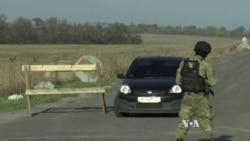There are growing fears that the ceasefire deal signed between pro-Russian rebels and the government in Ukraine may be falling apart. The separatists have launched several attacks on Donetsk airport. In the southeast, troops say rebel forces are launching daily attacks on their positions.
At the front line on the eastern outskirts of Mariupol, government troops laugh dryly when questioned about the ceasefire. They point to the remains of Grad rockets fired from separatist positions in recent days. The soldiers live in trenches and tunnels. Sandbags and mines are their protection against a rebel assault.
The checkpoint commander, Andriy, says the rebels’ weapons must have come from Russia.
“You can’t buy Grad rockets in a corner store,” he said. “They’re getting them from somewhere, from abroad. From the east.”
The separatists accuse Ukrainian troops of breaking the ceasefire. From his new base in Mariupol - where he was forced to flee after rebels captured Donetsk - the governor of the Donbas region, Sergiy
Taruta, strongly denies government forces are to blame.
"The troops have an order from the chief commander not to use weapons, unless they are attacked. Not once did they violate the ceasefire agreement. Unfortunately the truce is not working out to the extent that everyone had hoped," said Taruta.
The Russian-backed separatists appeared on the brink of capturing Mariupol when the ceasefire deal was signed in early September.
Now the city is decked in Ukrainian colors. A recent festival to mark the anniversary of a park opening, became a showcase of traditional Ukrainian culture. But among the crowd it’s not hard to find opinions at odds with the patriotic fervor.
“I think we should go with Russia. Definitely Russia,” said 16-year-old Yula.
Her friend Roman agrees.
“We lived a good life before this crisis,” he said. “Yes, we had debts; we had fights between Ukraine and Russia. But we lived in friendship.”
Also at the festival is Alexey Alexeyenko, spokesman for the volunteer Mariupol Self-Defense Force. He insists the vast majority of residents want to stay part of Ukraine - and many are prepared to fight for it.
“In the first days, 30 to 50 people were coming to sign up every day for the Mariupol battalions. We picked up some candidates for the [front line] Azov battalion. Our people are giving technical help behind the front lines," he said.
Analysts point the strategic position Mariupol occupies on the Azov Sea; currently a government-controlled city that lies between the rebels in the east and the Russian-controlled region of Crimea in the west. Authorities believe the separatists - who call themselves the ‘Donetsk People’s Republic’ - also want control of Mariupol’s vast iron and steelworks.
So far the city escaped the worst of the fighting. But the potential for renewed conflict is not far away.





